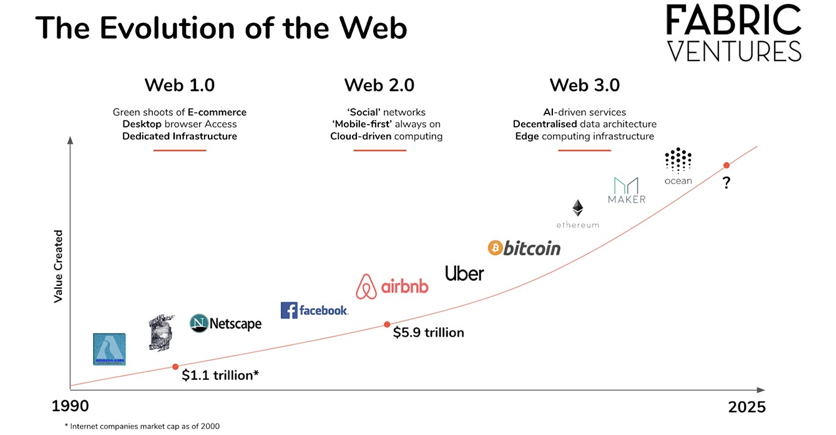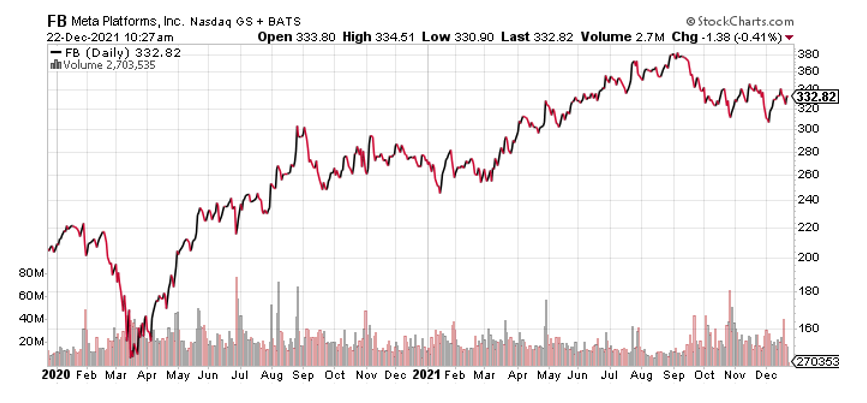A battle is currently underway for the future of the internet via Web 3.0 and blockchain technology.
Some investors seem to be missing the real dialect, and the best investment plays still look like the current winners.
On Tuesday, Jack Dorsey, Twitter’s (NYSE: TWTR) founder and CEO of Block (NYSE SQ), summed up Web 3.0 in a single tweet: “You (users) don’t own web3. Venture capitalists do.”
He has an excellent point, and it’s a big reason why Web 2.0 is currently superior.
The current internet — Web 2.0 — is a massive communications network where users exchange packets of data for digital products and services like Facebook and Google.
- This information is collected, mined and used primarily to serve relevant advertisements back to consumers.
This part of the business is not materially different than television and radio.
Related Post: Bitcoin Isn’t ‘Worthless’ … It’s the Future
Where Web 2.0 outflanks traditional ad-supported media is with the exchange of data, because Facebook and Google can also tailor content to keep users engaged longer, thus in turn, collecting even more data.
Over time, machine learning algorithms enabled them to make educated guesses about user behaviors that have become ad-buyer nirvana.
What’s Supposedly So Great About Web 3.0?
Web 3.0 uses blockchain technology and decentralization so consumers can remain anonymous.
- This breaks the stream of data being collected by big tech companies for their algorithms.
It also removes control of that information because the data is decentralized over many computers across the entire network, as opposed to a single network.
Messages and posts are not attached to individual accounts, nor can they be removed by a central governing authority.
- This would mean greater user control over personal data. Unlike Web 2.0, users would own their content, and the issuance of tokens would incentivize developers to maintain network security. It’s a win-win, in theory.
There are some important assumptions being made, though.

The architects of Web 3.0 assume anonymity and less regulation will lead to greater freedom for members. There’s also the part about network security and tokens.
In Web 3.0, changes to the network are made through voting … but this democratization is not as cut and dry as Web 3.0 proponents would have us believe, because those with the most tokens get the most votes.
- Jack Dorsey has a good idea about which entities are going to end up with the most tokens … unfortunately, it’s venture capitalists (VCs).
And we’re already seeing this firsthand.
The venture capitalist firm Andreessen Horowitz has devoted $3 billion to investments in Web 3.0, according to a report released on Tuesday by the Verge. The firm has also made big investments in crypto firms OpenSea and Dapper Labs… they’re developers building important Web 3.0 platforms.
Dorsey dismisses the idea that Web 3.0 will democratize the internet. His tweet is meant to hit the VCs where it hurts most.
He’s claiming that the platforms they’re building are not decentralized. They’re Meta Platforms’ (Nasdaq: FB) Facebook, Alphabet’s (Nasdaq: GOOGL) Google, etc. … just with a different label.
- And that brings us back to my original argument: The best way to invest in the future of the internet is the current internet.
Both Meta Platformsand Alphabet, the parent companies of Facebook and Google, are wonderful companies with long histories of building products consumers love and use daily.
Nobody is forcing 2.1 billion Facebook members to come back every day to view their daily feed ... arms are not being twisted at YouTube as members watch one billion hours of content daily.
- These businesses won the web by building better products.
There is a false premise that Facebook and YouTube members feel their privacy is being stolen. If this was true, membership would be declining … yet Facebook continues to grow year after year.
Related Post: Why DeFi Won't Kill Off Mastercard Just Yet
Statista notes Facebook members are approaching 60% of the connected world. And YouTube reached 2.3 billion users earlier in 2021, according to Business of Apps. For comparison, this is about 10 times the users of Netflix (Nasdaq: NFLX).
At a price of $334.20, Meta Platforms shares sell at only 23.4 times forward earnings despite gross margins of 80.9%.
Alphabet stock — currently selling at $2,889.45 — trades at 25.5 times forward earnings, with gross profit margins of 56.5%.
Savvy longer-term investors should consider buying both of these stocks into any near-term weakness.
Best,
Jon D. Markman


